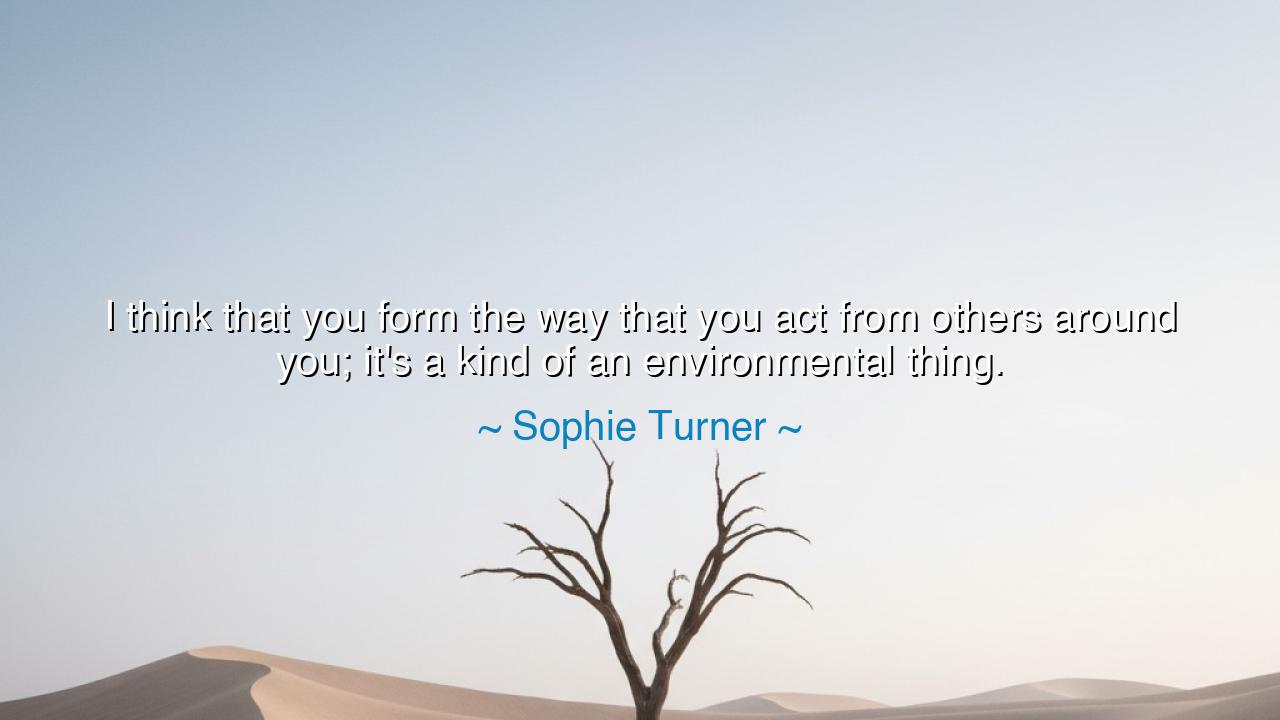
I think that you form the way that you act from others around
I think that you form the way that you act from others around you; it's a kind of an environmental thing.






Hear the words of Sophie Turner, spoken not in the voice of an ancient sage, but in the fresh tones of youth, yet bearing a truth as old as mankind: “I think that you form the way that you act from others around you; it’s a kind of an environmental thing.” In this utterance lies the eternal law of human growth—that man is shaped not in isolation, but by the company he keeps, by the patterns he sees, and by the influences that surround his days and nights.
For what is the environment, if not the silent sculptor of the soul? The child learns not from commands alone, but from the gestures, the laughter, the anger, and the courage of those who dwell around him. The youth imitates, the adult absorbs, the elder reflects—and thus generation after generation, character is not born in solitude but woven like a tapestry from the threads of community. Turner’s words remind us that our actions are mirrors of those we behold, and our behavior is a river fed by the streams of our surroundings.
Consider the story of Alexander the Great, whose mighty conquests shook the world. His greatness did not spring fully formed from his own heart. He was taught by Aristotle, who instilled in him a love of knowledge, and he was inspired by his father Philip, who forged Macedon into power. Surrounded by warriors, philosophers, and rulers, Alexander absorbed their strength and vision until he himself became the embodiment of empire. His life is proof of Turner’s wisdom: that the influence of others shapes the destiny of an individual.
But history also warns us of the darker side of environment. In Rome’s decline, young emperors grew in the company of flatterers, courtiers, and sycophants, who whispered lies and indulged every vice. These rulers, having no models of restraint, became tyrants or weaklings, and the empire itself withered. Thus we see the double edge of Turner’s insight: if good company raises a man to greatness, then corrupt company drags him into ruin. The soil in which we are planted determines much of the fruit we bear.
This truth is not distant, but close at hand. Think of a child raised in a home of kindness and patience—he learns to mirror kindness and patience in turn. But if raised amidst cruelty, suspicion, and anger, he may come to know these as the natural order of the world. Such is the power of environment, subtle yet unyielding, carving the heart in silence until the soul itself reflects its surroundings.
What, then, is the lesson for you? Choose carefully the company you keep. Surround yourself with those who lift you, who call you upward toward virtue, who awaken in you courage, discipline, and compassion. And likewise, be mindful of the influence you yourself cast upon others, for you, too, are part of someone else’s environment. Your words, your actions, your example—they shape the character of those around you, just as theirs shape you.
Therefore, let Sophie Turner’s words dwell in your heart: you are formed by others, and others are formed by you. Be vigilant, then, of the circles you walk within, and strive to create an environment of light rather than darkness. For though each man and woman must choose their path, the path is cleared or cluttered by the company they keep. Plant yourself among the wise, nurture others with your example, and you will help weave a world where the environment itself calls every soul toward greatness.






AAdministratorAdministrator
Welcome, honored guests. Please leave a comment, we will respond soon